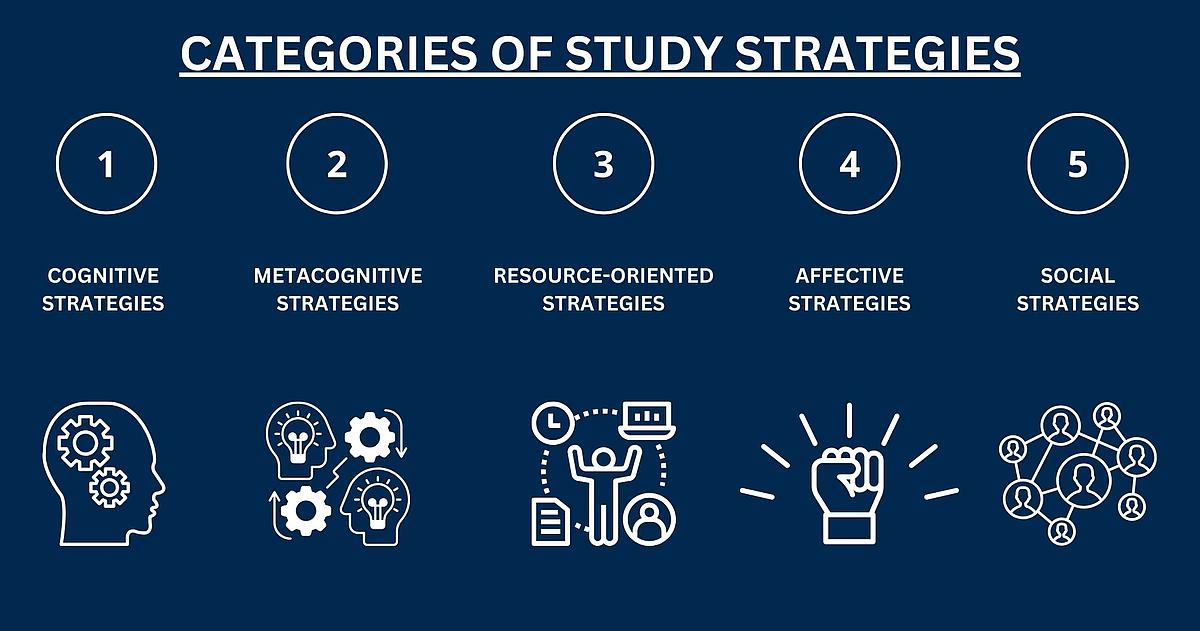This Website uses cookies to improve your visit on our website. More Info
Study Strategies that really work: Tips for studying efficiently
In a world that is constantly changing due to rapidly advancing technologies and ever-growing knowledge, lifelong learning has become not only an asset, but a necessity. In order to learn effectively and keep up with this constant change, it is essential to develop and apply effective study strategies. These strategies enable individuals to optimize their learning processes by improving both the absorption of new information and its long-term retention. We highlight the variety of study strategies to maximize your learning success.
Study Strategies Definition
Study strategies are systematic approaches, methods or plans that people use to make the learning process more efficient, effective and sustainable. They include various techniques and practices aimed at how learners absorb, process, store and reproduce information. They play an essential role in self-directed education and can be divided into cognitive, metacognitive and resource-oriented strategies.
What are Study Strategies?: The three Main Categories
Study strategies can be divided into three main categories:
- Cognitive Strategies: These involve direct interaction with the learning material. They include techniques such as repetition, elaboration (linking new information to what is already known), organization (structuring information through diagrams or summaries) and visual representation.
- Metacognitive Strategies: These strategies relate to awareness and control over one's learning process. They include planning (setting learning goals and selecting appropriate resources), monitoring (continually evaluating one's understanding and progress), and adapting (modifying approaches based on monitoring).
- Resource-oriented Strategies: These involve utilizing all available resources and environmental conditions that can support the learning process. These include the selection of appropriate learning locations, the use of technological tools, the organization of learning materials and the involvement of social resources such as study groups or teachers.
The effective use of study strategies enables learners to learn in a self-directed and goal-oriented manner, which is particularly important in educational institutions, professional contexts and in self-directed learning.
Study Strategies: Advantages and Disadvantages
Study strategies can improve the learning process, but they can also present challenges when used. It is important that learners choose strategies that suit their individual needs and learning contexts in order to take full advantage of the benefits and minimize the disadvantages. Here is a table that summarizes the advantages and disadvantages of study strategies accordingly:
| Advantages | Disadvantages |
|---|---|
| Increased efficiency - Study strategies optimize the learning process, save time and minimize learning effort. | Time required for familiarization - Learning and effectively applying study strategies initially requires time. |
| Improved retention - Techniques such as repetition and visualization improve long-term memory. | Overwhelm - A multitude of strategies can be overwhelming and lead to some not being used effectively. |
| Promoting deeper understanding - Strategies promote the linking of new and existing knowledge. | Frustration with failure - Not every strategy works equally well for every subject or learner. |
| Self-regulation and self-reflection - Learners can monitor their learning progress and adjust strategies as needed. | Possible dependency - Some learners may rely too heavily on certain strategies and be less flexible. |
| Adaptability and flexibility - Different strategies make learners more flexible in terms of learning environments and styles. | Cost - Some study strategies, especially technology-based ones, may involve costs for materials or software. |
| Increase motivation and engagement - Interactive and goal-oriented learning increases motivation and self-confidence. | Inefficiency if used incorrectly - Incorrectly applied strategies can disrupt the learning process or make it inefficient. |
| Dealing with learning difficulties - Adapted techniques help with specific challenges. |
Study properly: Why should you use Study Strategies during your studies?
Using study strategies is important for several reasons and offers numerous benefits:

- Increasing efficiency in the learning process: Study strategies help to optimize the way information is absorbed, processed and stored. They make learning more efficient by saving time and minimizing learning effort while improving comprehension and retention.
- Improving retention: Structured techniques such as repetition, visualization and the use of mnemonics enable learners to retain information longer and more accurately. This is particularly important in educational and professional environments where long-term retention of knowledge is required.
- Promoting deeper understanding: Strategies such as elaboration, where learners make connections between new information and existing knowledge, promote a deeper understanding of the subject matter. This deeper understanding enables learners to apply knowledge flexibly in different contexts.
- Self-regulation and self-reflection: Metacognitive strategies enable learners to monitor and regulate their own learning process. They can assess what is working well and what is not and make adjustments accordingly, leading to continuous improvement in their learning.
- Adaptability and flexibility: The ability to know and apply different study strategies makes learners more adaptable to different learning environments and styles. This is particularly useful in a rapidly changing world where the ability to acquire and apply new knowledge quickly is crucial.
- Boosting motivation and engagement: Effective study strategies can increase motivation by making learning more interesting and interactive. Achieving learning goals through strategic approaches can also boost self-confidence and lead to greater engagement in the learning process.
- Dealing with learning difficulties: Study strategies can specifically help overcome challenges and difficulties in the learning process by providing customized techniques that meet the learner's needs.
Overall, study strategies are crucial for lifelong learning and personal and professional development. They enable individuals to be proactive and self-directed learners, regardless of their age or educational background.

This is important for
study strategies

You should pay attention to this when using Study Strategies in your studies:
| Purposefulness | Set clear and realistic goals for your learning activities. This helps to sharpen your focus and gives you a concrete goal to work towards. |
|---|---|
| Adapt to individual learning style | Not every study strategy suits every learner. It is important to choose strategies that suit your personal learning style and needs. Experiment with different approaches and observe which deliver the most effective results. |
| Regular review and adjustment | The learning process is dynamic. Monitor your progress and adjust your strategies accordingly. If you find that a particular method is not producing the desired results, look for alternatives or adjust your approach. |
| Balance between different strategies | Don't rely exclusively on one type of strategy. A combination of different cognitive, metacognitive and affective techniques can often deliver the best results. This ensures a comprehensive and balanced learning experience. |
| Time management | Good planning is crucial. Organize your study times and breaks effectively to avoid overwhelm and maximize productivity. Make sure you allow enough time to review and consolidate what you have learned. |
| Use of resources | Use all available resources wisely. These include teaching materials, technological tools, social networks and external advice. These resources can significantly support and enrich your learning. |
| Self-motivation and self-awareness | Keep your motivation high by regularly reminding yourself why you are learning and what goals you want to achieve. Self-awareness about your own progress and challenges will help you stay proactive and engaged. |
| Get feedback | Use feedback from teachers, tutors or peers to reflect on and improve your learning process. Constructive criticism can be very valuable in identifying and correcting weaknesses. |
| Health and well-being | Don't forget to take care of your physical and mental health. Sufficient sleep, a healthy diet and physical activity are crucial for effective learning. |
When using study strategies, there are various aspects that you should pay attention to in order to ensure that you get the most out of your learning process. By paying attention to these aspects, you can ensure that you make the most of your study strategies and make your learning process effective and enjoyable.
Study Strategies Overview
The three main categories of study strategies can be expanded by two, thus summarizing many methods that help students learn. We summarize these categories of study strategies and give examples of specific techniques in each category. Study strategies can vary and be combined according to individual needs and context to achieve the best learning outcomes.
Overview of Study Strategies: The categories in one graphic
The following graphic provides a brief overview of the categories of study strategies that many people use successfully at school and during their studies.

Study Strategies Overview: The categories explained in more detail
Here is a clear explanation showing the different types of study strategies and some of their key elements:
Cognitive strategies
- Description: Techniques for direct interaction with the learning material. They promote the absorption and processing of information.
- Examples: Repetition, visualization, elaboration, organization, mnemonic aids.
Metacognitive strategies
- Description: Strategies that relate to awareness of one's own learning process. They involve planning, monitoring and adapting learning.
- Examples: Goal setting, monitoring understanding, adapting learning methods.

Resource-oriented strategies
- Description: Using all available resources and environments to support learning.
- Examples: Choice of learning environment, use of technological tools, time management, involvement of social resources.
Affective strategies
- Description: Strategies for regulating emotions and attitudes that influence learning.
- Examples: Stress management, increasing motivation, building self-confidence.
Social strategies
- Description: Using social interactions to promote learning.
- Examples: Learning groups, discussions, peer teaching, collaborative learning.

What Study Strategies are there?:
Examples for each Strategy

What exactly are the Study Strategies?:
| Cognitive strategies | Repetition | Going over material repeatedly to memorize it. |
|---|---|---|
| Elaboration | Connecting new information to existing knowledge or everyday life to develop a deeper understanding. | |
| Organization | Structuring and synthesizing information by creating diagrams, mind maps or summaries. | |
| Visualization | Using or creating visual aids such as graphs and charts to better understand and retain information. | |
| Mnemonics | Using memory aids, such as acronyms or rhymes, to make information easier to remember. | |
| Metacognitive strategies | Goal setting and planning | Setting specific, measurable learning goals and planning how to achieve them. |
| Monitoring | Self-monitoring during the learning process to ensure that understanding is progressing and goals are being met. | |
| Regulation and adaptation | Adapting learning methods based on self-monitoring to improve efficiency and effectiveness. | |
| Resource-oriented strategies | Time management | Effective use of available time by planning and prioritizing learning tasks. |
| Use of learning aids | Use of textbooks, notes, online resources, software and other aids to support the learning process. | |
| Social resources | Participation in study groups, discussions with peers or seeking feedback from teachers or tutors. | |
| Affective strategies | stress management | techniques for coping with test anxiety and study stress. |
| Increasing motivation | Setting personal incentives and rewards to increase motivation to learn. | |
| Building self-confidence | Developing a positive attitude towards one's own learning ability through a sense of achievement and positive self-talk. | |
| Social strategies | Collaborative learning | Learning in groups or with a partner to acquire and deepen knowledge through discussion and collaboration. |
| Peer teaching | Teaching learning content to others, which supports not only the "teacher" but also the "student", as explaining a topic deepens their own understanding. |
Each of these strategies can be adapted depending on the learning context and individual needs of the learner. Effective learners often combine multiple strategies to optimize their learning process and make learning more efficient, sustainable and fulfilling.
Study Strategies Examples presented
Each of the following strategies has its own strengths and can be used effectively depending on the learning context and personal preferences. By combining several strategies, the learning process can be further optimized and individualized. Here is a detailed explanation of different study strategies, including ways of application and benefits:
Mnemonics
Description: Mnemonics are memory aids that help to memorize information more easily through associations, pictures, structures or rhymes.
Application: Use acronyms (e.g. HOMES for the names of the Great Lakes) or mnemonics. You can also use the major system to learn numbers through pictures.
Benefits:
- Improved memory for facts and figures.
- Enables faster recall of learned information.
- Particularly useful when preparing for exams that require factual knowledge.
Peer Teaching
Description: Peer teaching involves explaining learning content to others, which deepens your own understanding.
Application: Organize learning groups in which each participant explains topics they are currently learning. The compulsion to make the material clear and understandable to others not only promotes deep understanding, but also reveals gaps in one's own knowledge.
Advantages:
- Deepens own understanding through teaching.
- Promotes communication skills and confidence in one's own knowledge.

Self-Testing
Description: Self-testing is the regular testing of your own knowledge to identify and close gaps.
Application: Create quizzes or practice tests to check how well you have mastered the material. Use flashcards or apps that encourage active recall.
Advantages:
- Effectively identify gaps in knowledge.
- Supports reinforcement of learning content.
- Improves exam preparation and reduces exam anxiety.
Interleaved Practice (alternating learning)
Description: Interleaved practice is the alternating practice of different skills or concepts in a learning session.
Application: Switching between different topics or types of problems during study, rather than working on a single topic for a long time.
Benefits:
- Improves ability to differentiate between concepts and apply them correctly.
- Increases problem solving skills through varied challenges.
Elaboration
Description: Elaboration refers to deepening understanding by making connections between new information and existing knowledge.
Application: Explain concepts in your own words, or find practical applications for theoretical knowledge. When learning a new topic, you can invent examples that illustrate the topic in everyday situations.
Benefits:
- Promotes deeper understanding.
- Improves ability to apply knowledge to new problems.
- Helps with long-term retention of information.
Organization
Description: Organization involves the systematic arrangement of learning materials to facilitate the learning process and optimize the search for information.
Application: You can organize information into logical structures such as lists, tables or hierarchies. Creating summaries and highlighting important text passages are also effective methods.
Advantages:
- Material can be worked through more quickly and recalled more easily.
- Maintain an overview of large amounts of information.
Pomodoro Technique
Description: The Pomodoro technique divides learning time into focused intervals, typically 25 minutes, followed by a short break.
Application: Set a timer for 25 minutes of focused learning, followed by a 5-minute break. After four such blocks ("pomodoros"), allow yourself a longer break of 15 to 30 minutes.
Advantages:
- Helps to avoid procrastination.
- Increases attention and concentration.
- Promotes a sustainable work pattern without overworking.
Concept Maps
Description: Concept maps visualize relationships between different ideas or concepts through connected nodes.
Application: Use tools such as Coggle or hand-drawn diagrams to create relationships and hierarchies between concepts.
Benefits:
- Makes it easier to understand complex structures.
- Helps to organize and quickly retrieve information.
Repetition
Description: Repetition is one of the oldest and most proven study strategies. It is based on the fact that information is better anchored in long-term memory through repeated revision.
Application: You repeat key concepts and details through regular reading, recitation or practice to reinforce memory and minimize forgetting. A typical example would be going over vocabulary or formulas on a daily basis.
Advantages:
- Simple and effective method of reinforcing knowledge.
- Promotes long-term retention.
Visualization
Description: Visualization involves creating mental images or scenarios to improve understanding and recall.
Application: Imagine how concepts work in practice, or draw scenarios in your mind to make abstract ideas tangible. It also includes drawing mind maps or using symbols and colors to highlight relationships and patterns.
Advantages:
- Supports memory and imagination.
- Makes abstract concepts more tangible and easier to understand.

Spaced Practice
Description: Spaced practice or "spacing effect" refers to planning study sessions over a longer period of time instead of studying intensively just before an exam.
Application: Plan study times with enough space between sessions, ideally spread over weeks or months.
Benefits:
- Promotes long-term retention of information.
- Reduces fatigue and increases overall learning efficiency.
Collaborative Learning
Description: Collaborative learning refers to working together in groups to achieve learning objectives. Through interaction and discussion with others, new perspectives can be opened up and understanding deepened.
Application: In learning groups, people work together on problems, discuss different views and share resources. This promotes social skills and can be motivating as you learn in a supportive environment.
Benefits:
- Access to new perspectives through collaboration.
- Increased motivation through social interaction and mutual support.

TIP: Don't rely on just one Study Strategy
It's important not to use just one study strategy, as everyone has different strengths and weaknesses and different types of information may require different approaches. For your learning success, it is always a good idea to regularly reflect on which methods work best in which contexts and how they can complement each other. This way, you can continuously improve and adapt your own learning process.
Study Strategies: Tips & Tricks
To get the most out of your study strategies and learn more effectively, the following tips and tricks will help:
- Define clear goals: Start with specific, measurable, achievable, relevant and time-bound (SMART) goals. This will help you track your progress and stay motivated.
- Develop a learning plan: Plan your learning activities in advance. Divide large tasks into smaller, manageable chunks and set fixed times for learning. This will help you stay structured and focused.
- Favor active learning: Actively engage with the material by asking questions, discussing or applying what you have learned. Active learning promotes deeper understanding and better retention of information.
- Alternate learning methods: Use different learning methods and techniques to avoid monotony and stimulate different aspects of your memory. For example, you could combine reading with visual aids, group work or practical exercises.
- Take breaks: Give your brain time to rest and process the information. The Pomodoro technique, where you work in 25-minute blocks followed by 5-minute breaks, can be particularly effective.
- Apply what you have learned in new contexts: Try to apply what you have learned to new situations or explain it in a different context. This improves your understanding and your ability to use knowledge flexibly.
- Self-testing and regular testing: Test yourself regularly to check your understanding and anchor information in your long-term memory. Self-created tests or quizzes can be very helpful here.
- Use technology and resources: Digital tools and resources can enrich your learning. Apps for notes, flashcards, online courses and interactive exercises offer varied learning opportunities.
- Reflect on your learning process: Take time regularly to reflect on your progress and challenges. What is working well? What could be improved? This reflection can help you to refine and adapt your methods.
- Maintain a positive attitude: An optimistic approach and confidence in your abilities can contribute significantly to the effectiveness of your learning. Self-motivation and perseverance are crucial for long-term success.
These tips and tricks can help you optimize your study strategies and make your learning more effective and enjoyable.
Similar Study Guide Topics:
Writing a Term Paper
Business studies with vocational diploma
What should I study?
Zurück zum Ratgeber
FAQ
The difference between learning techniques and study strategies lies in their scope and specificity. Learning techniques are specific methods or approaches used in learning to absorb, process and store information more effectively. Examples include using flashcards, writing summaries or using mnemonic devices.
Study strategies, on the other hand, are broader plans or approaches that determine how learning goals are to be achieved. They include the selection and application of different learning techniques, but also planning how to organize the learning material, setting learning goals and monitoring one's own learning progress. Study strategies are therefore broader and relate to the entire learning process, while learning techniques are concrete tools within this process.
Resource-based study strategies focus on making the best use of available tools and environmental conditions to support and enhance learning. These strategies include selecting and organizing learning materials, such as books, articles, online resources, and software, that are specifically designed to help students understand and master the subject matter.
Additionally, resource-based strategies include creating a conducive learning environment. This may include setting up a quiet, well-lit and ergonomic study space that is free from distractions. It also includes the use of social resources, such as study groups or advice from teachers and mentors.
Effective use of these resources also means being aware of your own learning needs and adapting your tools accordingly. This can include using technology that supports learning, such as learning apps or specialized software that helps visualize and organize complex information. By learning to choose and use their resources wisely, learners can make their learning process much more effective and customized.
Cognitive study strategies refer to the specific methods and techniques learners use to absorb, process and store information. These include, for example, organizing information by creating diagrams and summaries, repeating content to better anchor it in long-term memory or using mnemonic techniques to facilitate recall.
Metacognitive study strategies, on the other hand, concern awareness and control over one's own learning process. They involve planning how to approach a learning material, monitoring one's own understanding and progress during learning, and adapting strategies based on this self-observation. Metacognitive action helps learners to learn more effectively by encouraging them to reflect on their thinking and adapt their learning methods accordingly.
In summary, cognitive strategies enable direct interaction with the learning material, while metacognitive strategies help learners to understand and control their learning process. Both types of strategies are essential for successful and efficient learning.
Good study strategies are those that enable effective absorption, processing and retention of information. They include the clear definition of learning objectives to determine the direction and purpose of learning. Good time management is also important to ensure regular study times and avoid overload.
A varied application of different learning techniques can enrich the learning process and increase the breadth of understanding. These include actively summarizing texts, creating mind maps or using mnemonic techniques. Regular repetition and the application of what has been learned in practical or new situations are also key to strengthening long-term memory.
Self-monitoring and adaptation are also important aspects of good study strategies. This includes testing oneself to monitor progress and adapting learning methods accordingly. This reflective component helps to constantly improve the efficiency of the learning process. By actively engaging with your own learning in this way, you can significantly increase your personal learning ability.
The difference between learning methods and study strategies lies in their scope and focus. Learning methods are practical techniques or approaches used in learning to acquire knowledge and skills. These include, for example, group work, self-study, the use of multimedia or face-to-face teaching. They are specific approaches to conveying or absorbing learning content.
Study strategies, on the other hand, are more comprehensive and describe the overall plan a learner uses to achieve learning goals. They include the selection of learning methods and techniques as well as the planning and monitoring of the learning process. A study strategy includes organizing learning, setting goals, scheduling and evaluating one's own learning progress. It is therefore overarching and controls the application of different learning methods in the context of the overall learning project.
Interested in a study program? Request our information material now!
More exciting degree programs in Munich













